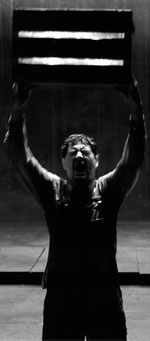|
|
 |
|
| THE GRAPES OF WRATH |
| Laura V. Shaw Theatre, Kalamazoo MI, November 2000 |
| Directed by |
Leon Ingulsrud |
| Set by |
Erich R. Keil |
| Lights by |
Jerome Hoppie |
| Sound by |
Matt Kneutsen |
| Costumes by |
Alexander Corzola |
|
|
|
|
|
|
|
| This production was based on the John Giulati addaptation of the
novel by John Steinbeck. We did some fairly severe re-working
of a number of scenes as well as both cutting and adding a good
deal of material. One of the things I was interested in was Steinbeck's
structure in the novel, in with he alternates chapters: after
each chapter dealing with the emotionally hot story of the Joad
family steinbeck inserts a chapter that is abstract and sometimes
phylosophical. Since Steinbeck was writing at the time of the
events he is describing, the novel is not a period piece. Therefore
the production drew on contemporary images for much of the inserted
material. |
|
Director's Note:
 |
A generation after the settlers pushed across the American plains
in their covered wagons to claim their 40 acres, an ecological
catastrophe of mind numbing proportions and a vigorously compassionless
economy are pushing a endless stream of nomads towards the promised
land of California. When they get there, instead of the idyllic
life picking fruit that they had set out for, the migrants find
themselves in camps where their humanity, strength and finally
their lives are systematically striped from them. This holocaust
is the backdrop for John Stienbeck’s THE GRAPES OF WRATH. |
|
 |
| The realities that the novel and it’s pursuant controversy, brought
to our attention still seem shocking today and take their place
alongside the genocide of aboriginal peoples, slavery and the
internment of Japanese Americans in the United States hall of
shame. Yet it is a sad truth that the homeless situation on our
doorsteps today represents our continued capacity for the heartlessness
of apathy, as we confuse ignorance for compassion. THE GRAPES
OF WRATH serves as a reminder that material poverty is not caused
by character flaws of the disenfranchised, but rather the spiritual
poverty of those who are materially blessed. |
 |
| Steinbeck did not write his book as a social tract. To the frustration
of many of his followers, he was not interested in activism. As
an artist he understood that his role was to give voice to those
who had none. Not a political or economic voice, but the complex
sound of the human heart. The cry and gnashing of teeth that is
the score of the soul. This is not a conflict between the oppressor
and the oppressed. This is a conflict between a soul which is
free and the world which it finds itself in. |
 |
| Theatre is an act of communal memory. It’s holiness rests in it’s
ability to connect the inner-most depths of our lives with lives
that have gone before us and with whom we share a journey. By
focusing our attention on the struggle of one family in one specific
situation, this work becomes about the persistence and universal
inevitability of tragedy and the sheer, unshakable human beauty
that it engenders. |

Please feel free to contact Leon if you have any comments or questions. |
|
|